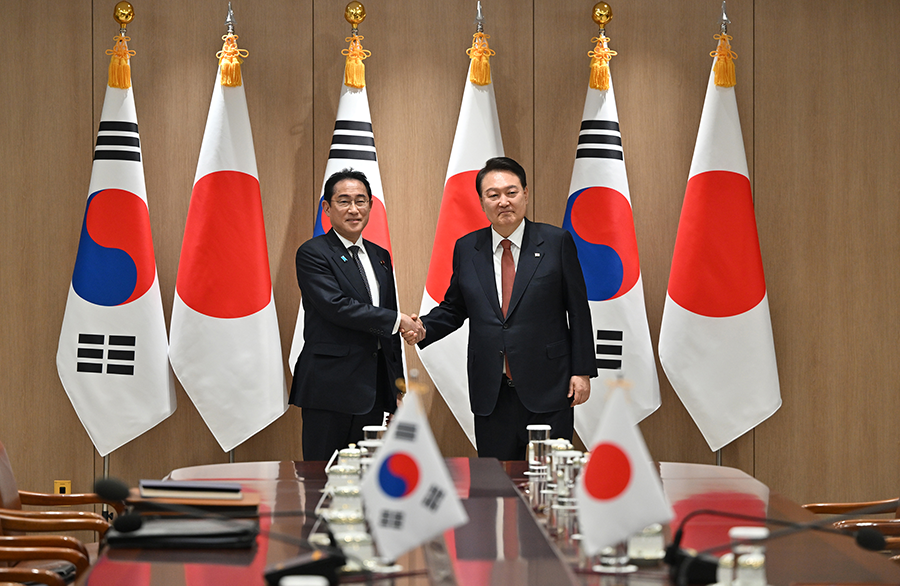"No one can solve this problem alone, but together we can change things for the better."
North Korea Vows Response to U.S.-South Korean Plans
June 2023
By Kelsey Davenport
North Korea said it will take decisive action in response to the decision by the United States and South Korea to enhance their nuclear deterrence consultations and called it a product of hostile policy toward Pyongyang.
 U.S. President Joe Biden and South Korean President Yoon Suk Yeol announced on April 26 the formulation of the Nuclear Consultative Group and a more regular deployment of U.S. strategic assets around the Korean peninsula to counter the threat posed by North Korea’s growing nuclear weapons program. The group will give South Korea more opportunities to discuss and provide input on U.S. nuclear and strategic planning. (See ACT, May 2023.)
U.S. President Joe Biden and South Korean President Yoon Suk Yeol announced on April 26 the formulation of the Nuclear Consultative Group and a more regular deployment of U.S. strategic assets around the Korean peninsula to counter the threat posed by North Korea’s growing nuclear weapons program. The group will give South Korea more opportunities to discuss and provide input on U.S. nuclear and strategic planning. (See ACT, May 2023.)
In an April 28 statement in the state-run Korean Central News Agency (KCNA), Kim Yo Jong, the sister of North Korean leader Kim Jong Un, accused the United States and South Korea of creating an environment in which North Korea is “compelled to take more decisive action” to deal with new threats.
If the United States and South Korea are “dead set on staging nuclear war exercises” and deploying nuclear assets, “the stronger the exercise of [North Korea’s] right to self-defense will become,” she said. She said North Korea is “convinced once again” that the country’s “nuclear war deterrent” should be “brought to further perfection.”
Kim Yo Jong criticized Biden directly for threatening to end the North Korean regime if it were to use nuclear weapons against the United States, its allies, or its partners. Biden made the comment during the April 26 press conference with Yoon. Kim called the comment “threatening rhetoric” and accused Biden of overconfidence.
Yoon has sought greater South Korean involvement in the U.S. extended nuclear deterrent, but he faced criticism in South Korea for agreeing to the Washington Declaration that resulted from his summit with Biden. Factions within Yoon’s conservative party accused him of tying Seoul’s hands on developing its own nuclear weapons by reaffirming the country’s commitment to the nuclear Nonproliferation Treaty and expressing “full confidence” in U.S. extended deterrence in the declaration. Policymakers in the opposition party said the agreed measures raise tensions with North Korea without alleviating South Korea’s security concerns.
Yoon continues to defend the Washington Declaration as necessary to counter the North Korean threat. In a May 2 cabinet meeting, he said the consultative group “upgraded” the U.S.-South Korean alliance and will make U.S. extended deterrence more effective.
Unsurprisingly, China and Russia also criticized the Washington Declaration and accused the United States of being the source of regional tension.
Russian Foreign Ministry spokeswoman Maria Zakharova said in an April 28 statement that the decision to form the consultative group “is clearly destabilizing in nature” and will have “negative consequences for regional security.” She accused the United States of provoking an arms race.
At an April 27 press conference, Chinese Foreign Ministry spokeswoman Mao Ning said that the U.S.-South Korean decision stokes confrontation and “undermines the nuclear nonproliferation system.” She said Washington’s actions are “the very opposite of the goal to denuclearize” the Korean peninsula.
But Yoon faulted Beijing for not doing enough to respond to Pyongyang’s nuclear weapons program. He said on May 2 that if China wishes to “raise objections,” it must do more to reduce the nuclear threat posed by North Korea “or at the very least abide by UN Security Council resolutions” and sanctions.
Mao said in a May 4 press briefing that China supports “fully and accurately” implementing all provisions of UN Security Council resolutions, including support for dialogue and humanitarian assistance. She said the United States “has yet to respond to [North Korea’s] legitimate security concerns” and that a “balanced approach” is necessary to mitigate tensions.
A May 19 statement by the Group of Seven (G-7) industrialized nations also called for sanctions on North Korea to be “fully and scrupulously” implemented and “remain in place for as long as” the country’s weapons of mass destruction and ballistic missile programs exist. The statement demanded that North Korea “refrain from any other destabilizing or provocative actions, including any further nuclear tests or launches that use ballistic missile technology.”
Prior to the G-7 meeting, Japanese Prime Minister Fumio Kishida met Yoon in South Korea on May 7. They agreed to further enhance security cooperation and to link South Korean and Japanese missile tracking through the U.S. Indo-Pacific Command. Connecting the radars tracking North Korean missile launches will help fill gaps in missile detection and share data in real time.
Yoon was criticized at home for meeting Kishida due to the lingering animosity between the two countries stemming from Japan’s wartime occupation of South Korea. But Yoon defended his decision, asserting that “Japan and South Korea are facing a grave security situation” that requires cooperation before “past issues are fully resolved.”
Kishida said the two leaders agreed on the “importance of enhancing deterrence and response capabilities,” including through security cooperation between “Japan and South Korea and among Japan, South Korea, [and] the [United States] in the face of ongoing provocations by North Korea and attempts to unilaterally change the status quo through force in this region.”
